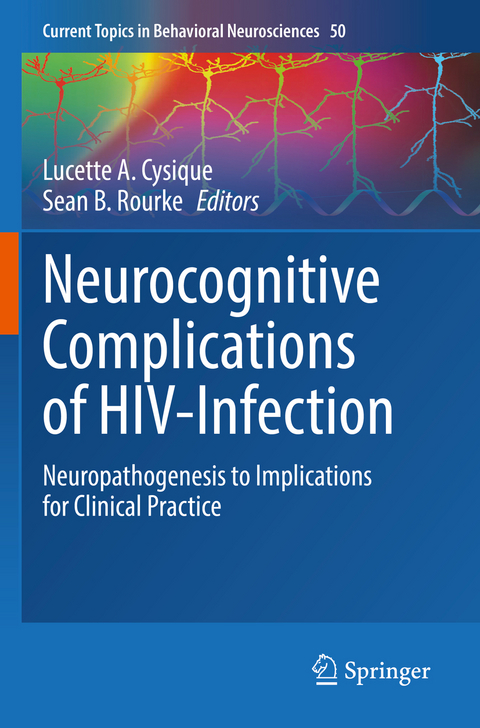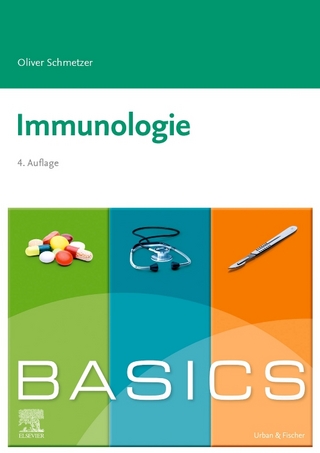
Neurocognitive Complications of HIV-Infection
Springer International Publishing (Verlag)
978-3-030-80761-0 (ISBN)
The chapter, "Metabolic Syndrome and Cardiovascular Disease Impacts on the Pathophysiology and Phenotype of HIV-Associated Neurocognitive Disorders", of this book is available open access under a CC BY 4.0 license at link.springer.com
Lucette A. Cysique, Ph.D is an Associate Professor and neuropsychologist at the University of New South Wales, Sydney, Australia and a visiting scholar at MAP Centre for Urban Health Solutions, Li Ka Shing Knowledge Institute, St. Michael’s Hospital, Toronto, Canada. A/Prof. Cysique has been leading cross-disciplinary research into the neurocognitive and brain changes associated with HIV since 2009. A/Prof. Cysique has expertise in the measurement of cognitive trajectories in longitudinal cohort studies and clinical trials, and also contributes to the development of normative neuropsychological data for cross-sectional and longitudinal studies. Additionally, Dr. Cysique has extensive experience in cross-cultural neuropsychology.Sean B. Rourke, PhD is a clinical neuropsychologist and international expert in the neurobehavioral complications of HIV/AIDS. He is a scientist with MAP Centre for Urban Health Solutions in the Li Ka Shing Knowledge Institute of St. Michael’s Hospital at Unity Health Toronto, a director for REACH Nexus funded by the Canadian Institutes of Health Research, and a professor of psychiatry at the University of Toronto. He is a Fellow with the Canadian and American Psychological Associations, and the Canadian Academy of Health Sciences. As a social entrepreneur his work involves novel approaches to community stakeholder engagement, partnership development across disciplines and sectors, and innovative research-to-action strategies for access to HIV testing and linkages to care (www.readytoknow.ca) and ending HIV stigma in Canada (www.positiveeffect.org).
I. Neuropathogenesis and Biomarkers.- New Potential Axes of HIV Neuropathogenesis with Relevance to Biomarkers and Treatment.- Neurocognitive Impairment and Associated Genetic Aspects in HIV Infection.- Inflammatory Mechanisms and Cascades Contributing to Neurocognitive Impairment in HIV/AIDS.- Neuroimaging Advances in Diagnosis and Differentiation of HIV, Comorbidities, and Aging in the cART Era.- II. Neurocognitive Impairments in Low-, Middle- and High-Income Countries - Incidence / Prevalence and Contexts.- Neurocognitive Complications of Pediatric HIV Infections.- Neurocognitive Complications of HIV Infection in Women: Insights from the WIHS Cohort.- Cultural Neuropsychology Considerations in the Diagnosis of HIV- Associated Neurocognitive Disorders.- Neurocognitive Complications of HIV Infection in Low-Income Countries.- Deep Phenotyping of HIV Neurocognitive Complications Among Individuals Residing in High-Income Countries.- Reliably Measuring Cognitive Change in the Era of Chronic HIV Infection and Chronic HIV-Associated Neurocognitive Disorders.- III. Comorbidities and Complications.- Geriatric Syndromes in People Living with HIV Associated with Ageing and Increasing Comorbidities: Implications for Neurocognitive Complications of HIV Infection.- Conceptualizing and Assessing Everyday Functioning in the Context of HIV-Associated Neurocognitive Disorders.- Neuropsychiatric Disorders, Emotional Disturbances, and Their Associations with HIV-Associated Neurocognitive Disorder.- Metabolic Syndrome and Cardiovascular Disease Impacts on the Pathophysiology and Phenotype of HIV-Associated Neurocognitive Disorders.- HIV-Associated Neurocognitive Disorder (HAND): Relative Risk Factors.- IV. Screening, Interventions and Clinical Management.- Screening for HIV-Associated Neurocognitive Disorders: Sensitivity and Specificity.- Behavioral and Physical Activity Interventions for HAND.- Targeting HIV-Related Neurocognitive Impairments with Cognitive Training Strategies: Insights from the Cognitive Aging Literature.- Clinical Treatment Options and Randomized Clinical Trials for Neurocognitive Complications of HIV Infection: Combination Antiretroviral Therapy, Central Nervous System Penetration Effectiveness, and Adjuvants.
| Erscheinungsdatum | 01.11.2022 |
|---|---|
| Reihe/Serie | Current Topics in Behavioral Neurosciences |
| Zusatzinfo | XVII, 545 p. 100 illus., 30 illus. in color. |
| Verlagsort | Cham |
| Sprache | englisch |
| Maße | 155 x 235 mm |
| Gewicht | 854 g |
| Themenwelt | Medizin / Pharmazie ► Medizinische Fachgebiete ► Mikrobiologie / Infektologie / Reisemedizin |
| Studium ► Querschnittsbereiche ► Infektiologie / Immunologie | |
| Naturwissenschaften ► Biologie ► Humanbiologie | |
| Naturwissenschaften ► Biologie ► Mikrobiologie / Immunologie | |
| Naturwissenschaften ► Biologie ► Zoologie | |
| Schlagworte | clinical practice • etiology • Hand • HIV-associated neurocognitive disorder • Interventions • Neuropathogenesis |
| ISBN-10 | 3-030-80761-4 / 3030807614 |
| ISBN-13 | 978-3-030-80761-0 / 9783030807610 |
| Zustand | Neuware |
| Informationen gemäß Produktsicherheitsverordnung (GPSR) | |
| Haben Sie eine Frage zum Produkt? |
aus dem Bereich


